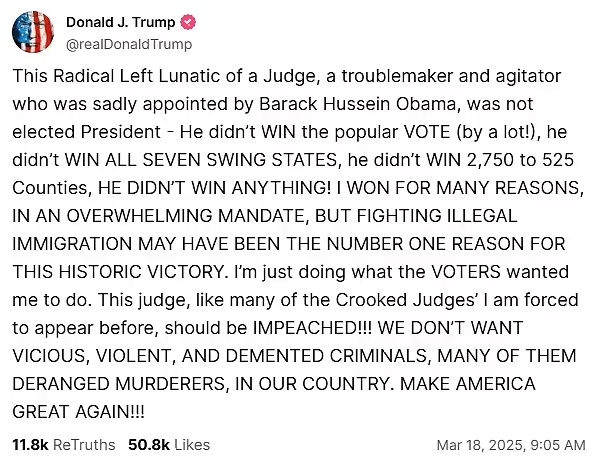White House Fires Back After Judge Blocks Trump Deportation Flights
White House Press Secretary Karoline Leavitt came out swinging after a federal judge blocked President Donald Trump’s deportation flights, calling the decision a politically charged move and slamming the judge’s personal ties.
Leavitt accused U.S. District Judge James Boasberg—who issued the temporary halt—of being a partisan “activist,” even criticizing his wife for past political donations. Trump echoed the sentiment, labeling Boasberg a “radical left lunatic” and threatening to push for his impeachment.
According to Leavitt, Judge Boasberg’s ruling challenges the president’s executive authority to remove foreign terrorists from U.S. soil—an authority she insists is granted under the Alien Enemies Act. She emphasized that the deportation campaign would move forward regardless of the court’s interference.
Boasberg, a Democratic appointee of former President Barack Obama, has drawn heavy criticism from conservative circles. Leavitt also blasted the administration for keeping secret the identities of individuals deported to El Salvador, whom officials claim are linked to violent gangs.
Despite concerns voiced by Chief Justice John Roberts about the escalating tensions between branches of government, Trump allies are rallying. Representative Lauren Boebert, known for her fierce support of the former president, has backed the initiative and previously filed a resolution to impeach President Biden.
Meanwhile, Republican Representative Brandon Gill announced he will introduce articles of impeachment against Judge Boasberg this week.
Legal analysts have raised alarms, warning that Trump’s actions may be undermining judicial review and violating the Constitution’s separation of powers.

Supreme Court Rebukes Trump Over Attacks on Judiciary Amid Mounting Legal Tensions
The U.S. Supreme Court issued a rare public rebuke to President Donald Trump following his inflammatory calls to impeach a federal judge who blocked his effort to deport Venezuelan gang members to El Salvador.
In a sharply worded statement, the Court criticized both Trump’s rhetoric and the Justice Department’s defense of the president’s plan. The DOJ had accused the judge of engaging in “digressive micromanagement,” arguing the ruling undermined decisions made by a “coequal branch” of government. The Supreme Court dismissed that claim, warning it reflected a “complete misunderstanding” of the complex national security, safety, and logistical challenges at stake—particularly when court directives affect aviation operations abroad.
The high court’s response followed Trump’s branding of the lower court judge as a “radical left lunatic,” a remark that sparked backlash from legal experts and further fueled concerns about executive overreach.
This latest legal clash adds to a growing chorus of warnings from liberal constitutional scholars, who argue the nation is teetering on the edge of a constitutional crisis. Multiple court rulings have challenged the broad scope of executive powers Trump claims are his alone.
The tensions extend beyond immigration. Trump has also lashed out at the Justice Department’s rumored support for impeaching Judge Aileen Cannon, who previously ruled in his favor in a high-profile classified documents case. In a fiery speech, Trump praised Cannon and slammed her critics as “fake lawyers.”
Adding fuel to the fire, billionaire tech mogul and Trump advisor Elon Musk has joined the push, calling for the impeachment of judges who have ruled against Trump administration policies—including those concerning the mass firing of federal workers. House Republicans, aligning with Musk, have begun echoing the call, signaling a broader effort to reshape the judiciary.
As legal battles pile up and rhetoric intensifies, the judiciary remains caught in the crossfire of a power struggle with far-reaching implications for the balance of American democracy.

Rep. Brandon Gill Moves to Impeach Judge Who Blocked Trump-Era Deportations
Rep. Brandon Gill is preparing to file Articles of Impeachment against federal judge James Boasberg, calling him an “activist judge” after Boasberg temporarily blocked the deportation of more than 200 individuals under the 1798 Alien Enemies Act. The ruling has become a lightning rod in an already tense legal standoff between the judiciary and the Trump-aligned wing of the GOP.
The White House maintains that those deported were members of the Venezuelan criminal organization Tren de Aragua, now allegedly incarcerated in El Salvador. However, officials have refused to release the names of the individuals, sparking criticism from both lawmakers and civil rights advocates.
The American Bar Association has stepped in, warning that political attacks on judges threaten the independence of the judiciary. “Intimidation of the legal profession cannot be sanctioned or normalized,” the ABA said in a pointed statement clearly aimed at rising efforts to impeach sitting judges.
Trump has continued to target judges presiding over his legal battles, frequently attacking them from the campaign trail. Meanwhile, tech billionaire Elon Musk has taken to social media and public appearances to criticize members of the federal bench, further amplifying anti-judiciary sentiment on the right.
Despite the surge of rhetoric, experts caution that impeaching a federal judge is an exceptionally high bar under Article III of the Constitution. Still, the effort is gaining momentum: Rep. Andy Ogles has introduced a separate resolution to impeach Judge John Bates, another jurist who has ruled against Trump-aligned policies.
With tensions rising between branches of government, the push to remove federal judges signals a growing willingness among Trump loyalists to challenge long-held norms of judicial independence—and possibly reshape the courts through political pressure.